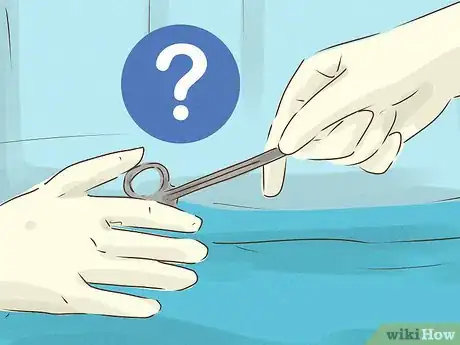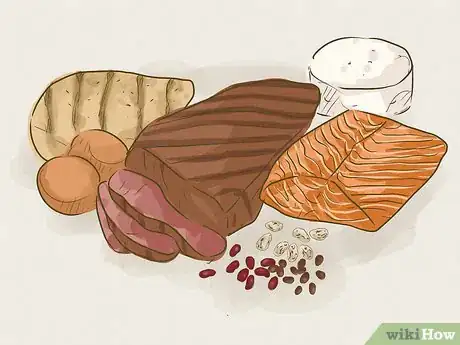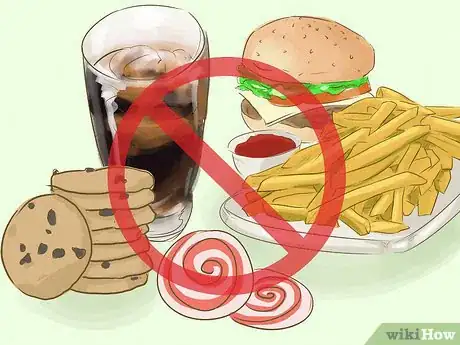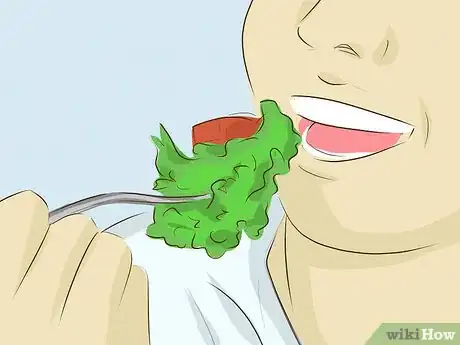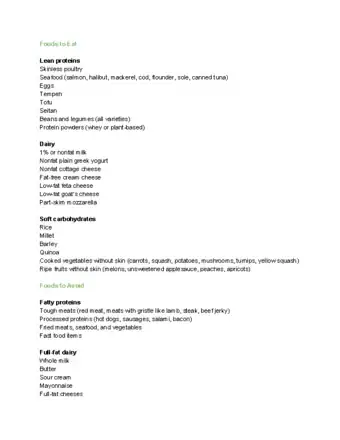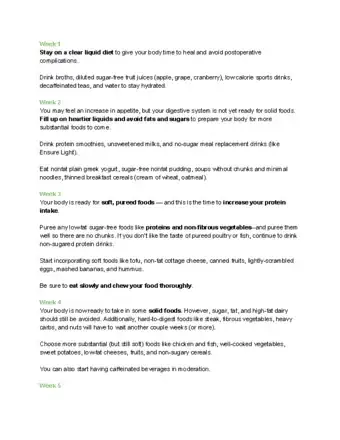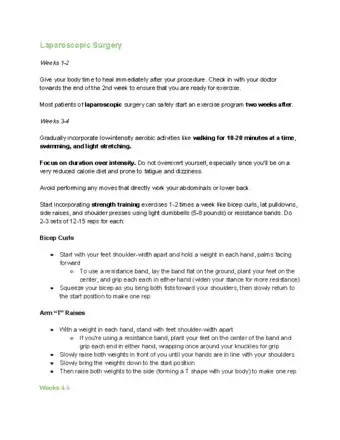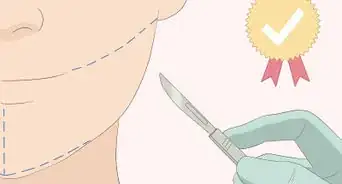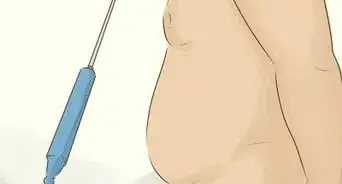This article was co-authored by Claudia Carberry, RD, MS. Claudia Carberry is a Registered Dietitian specializing in kidney transplants and counseling patients for weight loss at the University of Arkansas for Medical Sciences. She is a member of the Arkansas Academy of Nutrition and Dietetics. Claudia received her MS in Nutrition from the University of Tennessee Knoxville in 2010.
This article has been viewed 26,785 times.
Many patients who’ve undergone gastric bypass surgery lose weight the first few months after their procedure. However, in the long run, it’s quite common for some of those pounds to return. To push back against any weight gain, it’s critical that you reconnect with a professional support system including your doctor and a registered dietitian. Making additional dietary and exercise changes will also help to kick-start your weight loss. Although you may have a difficult journey ahead, it’s possible to achieve your weight goals.
Steps
Seeking Professional Advice
-
1Talk with your doctor. If the weight has started to creep back on, it’s a good idea to reach out to your doctor for advice and assistance. They will usually start by giving you a physical evaluation. Then, they may want to discuss any lifestyle changes that you’ve made. This is a time to be as honest as possible so that they can help you develop a plan.[1]
- Don’t be embarrassed or ashamed when reaching out to your doctor for help. The very fact that you are seeking advice is a great first step towards success.
- For example, you could ask your doctor, “What foods should I avoid?” Another possible question might be, “How many pounds should I expect to lose each week?”
-
2Revisit your bariatric doctor’s advice. Both before and after your surgery your doctor likely provided you with extensive information and advice regarding how to live a healthy life moving forward. Pull out these materials and read over them once more. See if there is anything that you missed the first time or that you are not currently doing now.[2]
- This information might discuss the best workout programs for gastric bypass patients. It could also contain a detailed dietary plan.
Advertisement -
3Evaluate the need for a second surgery. After consulting with you, your doctor might suggest that you’d benefit from a surgery to correct any changes that might have occurred since your last procedure. In particular, it’s possible that your stomach pouch has stretched out over time allowing more food to be processed.[3]
- A second surgery is very rarely done, especially if the weight gain is due to diet choices and/or a lack of exercise.
- Make sure to discuss all possible complications with your doctor when considering another surgery. The risk levels for infection and bleeding usually increase with a second procedure.
Getting Extra Support
-
1Attend nutritional counseling sessions. If you’ve been working with a nutritional counselor already, consider meeting more frequently or even switching counselors. If you have not meet with a registered dietitian, ask your doctor for a referral. Then, work with your dietitian to create a dietary plan that fits your lifestyle and weight loss goals.[4]
- A dietitian can also teach you how to monitor your daily food intake by using apps or even paper food trackers.
- It may be tempting to quit seeing your dietitian after you begin to lose the weight again. Don’t fall into this trap! Keep meeting with them for as long as you can afford it. Consider it an investment in your long-term well-being.
-
2Treat any underlying eating disorders. This is a sensitive subject, but it’s a reason why some patients gain weight post-surgery. If you find yourself grazing on food throughout the day or bingeing, then ask your doctor for a referral to a behavioral therapist. They will help you to understand the triggers that lead to poor eating choices and how to avoid them.[5]
- Similarly, if you try to deprive yourself to lose the weight that is another reason to talk with a therapist.
-
3Join a post-surgery support group. These are groups of people who’ve undergone weight loss surgeries who meet together frequently to discuss any challenges that they are facing. It’s a safe space to ask for advice regarding coping with food urges, for example. Your doctor or the hospital where your surgery took place can offer you a referral.[6]
-
4Address any alcohol or substance abuse issues. Drinking alcohol consistently can cause weight gain and other health problems. If you turn to illegal substances to curb cravings, it can damage your health as well. To manage and minimize these addictions, reach out to your doctor or therapist.[7]
- For example, your doctor might suggest that you join a support group immediately post-surgery.
Making Lifestyle Changes
-
1Set realistic weight loss goals. This sounds much easier than it actually is. Work with your dietitian, personal trainer, and doctor, to establish how many pounds you can realistically lose each week in a healthy way. For many people, aiming for roughly 1-2 pounds per week is a reasonable goal. If you try to lose too much too fast, you run the risk of hurting your body or relapsing into bad habits.[8]
- On a similar note, don’t become completely obsessed with the scale. Check your weight daily to self-monitor your weight loss.[9]
-
2Increase your protein intake. Proteins are what your body uses to build muscle, which makes it possible to burn more calories and fat. Look for low-fat protein options, such as skinless chicken or fish. Experiment with different preparations, so that you’ll still get a flavorful meal. Talk with your dietitian about exactly how much protein you should be eating each day.[10]
- Mixing high texture foods with proteins is another way for you to stay satisfied. For example, try pairing celery with peanut butter for one of your meals or snacks.
-
3Limit sugars and fatty foods. Less than 30% of your daily calories should come from fat or fatty foods. Before you eat a processed food, read over the label to see exactly what goes into it. If a form of sugar is listed early in the ingredients list, skip it and find an alternative. Also, replace sugary drinks with water.[11]
- For example, avoid foods that contain glucose or fructose, which are versions of sugar.
-
4Be physically active for at least 30 minutes per day. As soon as you are cleared for exercise by your doctor post-surgery, it’s important to develop a fitness program and stick with it. It might help to work with a trainer to stay motivated and on task. If you start to gain weight, check to see that you are elevating your heart rate for at least 30 minutes each day by biking, walking, swimming, or even jogging.[12]
- One of your goals should be to build up to 60-90 minutes of moderate physical activity for most days of the week. This means that fitness will become part of your daily routine.
-
5Eat and chew slowly. If you swallow food whole without chewing thoroughly, it can stretch out your stomach pouch. Instead, savor each bite of food and chew until it is fully broken down before swallowing. An average meal should take around 30 minutes to eat, so make sure to give yourself enough time.[13]
- If you feel a sharp pain in your chest or if you gag/vomit after a meal, then you’ve likely eaten too fast.
- Heavy carbs, such as pasta or bread, can be particularly uncomfortable if you don’t chew them thoroughly.
-
6Eat 6 small meals each day. If you eat large meals, you are more likely to stretch out your stomach pouch, which can lead to weight gain. Instead, divide up your food intake into 6 small meals spaced out every few hours throughout the day. Pay attention to your body while you are eating and stop the minute that you feel full.[14]
- If you have a meal scheduled and you are not hungry, it’s okay to skip it. If this becomes a habit, reevaluate your food plan with your dietitian.
-
7Monitor your water and fluid intake. Boosting your water weight can actually lead to true weight loss. Aim to drink at least 8 full cups of water or calorie-free drinks each day. Take small sips when drinking and use a straw to minimize any discomfort from stomach air.[15]
- It’s also a good idea to avoid drinking during meals or 30 minutes beforehand. This leaves room in your stomach for actual food.
Sample Dietary Changes and Exercise Plan
Warnings
- If you feel sharp pains in your abdomen or start running a fever soon after surgery, these are signs of possible complications. Reach out to your doctor or other medical professionals right away.⧼thumbs_response⧽
References
- ↑ https://www.mayoclinic.org/tests-procedures/bariatric-surgery/expert-answers/gastric-bypass-surgery/faq-20057845
- ↑ https://www.bariatric-surgery-source.com/weight-gain-after-gastric-bypass.html#ways
- ↑ https://www.mayoclinic.org/tests-procedures/bariatric-surgery/expert-answers/gastric-bypass-surgery/faq-20057845
- ↑ https://www.ncbi.nlm.nih.gov/pmc/articles/PMC5233838/
- ↑ https://www.ncbi.nlm.nih.gov/pmc/articles/PMC5233838/
- ↑ https://www.bariatric-surgery-source.com/weight-gain-after-gastric-bypass.html#ways
- ↑ https://www.bariatric-surgery-source.com/weight-gain-after-gastric-bypass.html#ways
- ↑ https://www.ncbi.nlm.nih.gov/pmc/articles/PMC5233838/
- ↑ https://www.cnn.com/2015/08/13/health/scale-weigh-in/index.html
- ↑ https://medlineplus.gov/ency/patientinstructions/000334.htm
- ↑ https://www.ncbi.nlm.nih.gov/pmc/articles/PMC5233838/
- ↑ https://www.ncbi.nlm.nih.gov/pmc/articles/PMC5233838/
- ↑ https://medlineplus.gov/ency/patientinstructions/000334.htm
- ↑ https://medlineplus.gov/ency/patientinstructions/000334.htm
- ↑ https://medlineplus.gov/ency/patientinstructions/000334.htm


